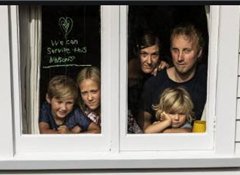Home : Research Results : More are feeling lonely after COVID-19 lock down than before
Research Results
More are feeling lonely after COVID-19 lock down than before
31 Jul 20

More people are feeling lonely after the COVID-19 lockdown than before it.
The incidence of prolonged loneliness in New Zealand has increased from 3.5% of the New Zealand adult population before lockdown to about 10.6% during lockdown, before slightly falling to 8.7% post-lockdown, according to a new study supported by Horizon Research.
The number of people experiencing prolonged loneliness – where people self-report feeling lonely most or all of the time – was of concern pre-COVID-19. Since the onset of the global pandemic a question raised is whether the incidence of prolonged loneliness has increased or decreased from pre-pandemic levels during and after lockdown.
This question is addressed in a new report by the Loneliness New Zealand Charitable Trust. Written by Dr Spencer Scoular, the report compares prolonged loneliness before, during, and after lockdown using the Stats NZ General Social Survey, the Victoria University Lockdown Survey, and the just-released Loneliness NZ Post-Lockdown Survey (administered by Horizon Research).
The report finds the incidence of prolonged loneliness has increased from 3.5% of the New Zealand adult population before lockdown to about 10.6% during lockdown, before slightly falling to 8.7% post-lockdown.
Of particular concern, the incidence of prolonged loneliness for youth increased from 5.8% of youth before lockdown to about 20.8% during lockdown, before slightly falling to a still very high 17.0% post-lockdown.
"It is disheartening," Scoular reflects, "that, after lockdown, one in six of our youth feel lonely most or all the time.”
To give context, after lockdown, the incidence of prolonged loneliness of youth (17.0%) is 4.4x the incidence of prolonged loneliness of seniors (3.9%) – a demographic that has historically been perceived to be lonely.
And the problem is wider than our youth. Other demographic groups are also struggling with high incidences of prolonged loneliness after lockdown, including solo parents (18.1%), unemployed (16.2%), Asian (13.2%), those with no qualifications (11.8%), those in a household with income of $30,000 or less (11.7%), those not in a family nucleus (11.6%), those with a personal income of $30,000 or less (11.0%), and those with disability (10.9%).
“This problem is far larger than objective social isolation,” Scoular explains. “Loneliness is a subjective emotional state that arises from not having the desired sufficient meaningful connections with others – those people you could rely on in time of need.”
“Conquering prolonged loneliness requires high quality meaningful relationships, rather than a large number of low quality superficial relationships,” says Scoular.
Whilst there remains higher unemployment, lower incomes, border restrictions, and working from home, meaningful connections will be harder to develop and sustain, increasing the risk of people experiencing prolonged loneliness and poor wellbeing.
The global pandemic will be with us in the foreseeable future. During this time we need to address the needs of those experiencing prolonged loneliness for the benefit of these individuals, their family, whānau, colleagues, and our communities.
Read more:
Click on the hyperlink to download our report Prolonged loneliness in New Zealand before, during, and after lockdown
HorizonPoll Online Survey system
and website developed by BEWEB
Copyright © 2010. HorizonPoll incorporating ShapeNZ - Listening to New Zealand


